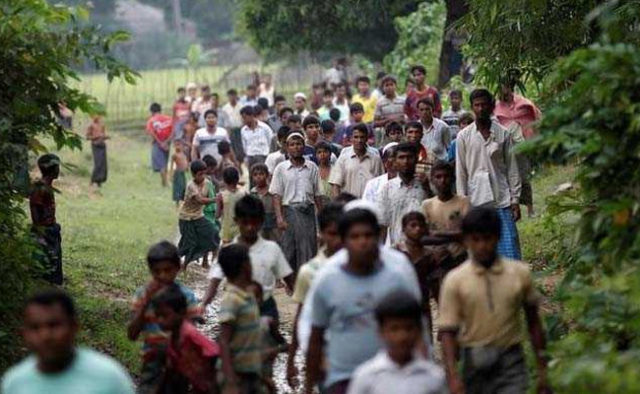The lack of humanitarian access granted by Myanmar’s government to Rakhine state, where more than half a million Rohingya Muslims have fled violence, is “unacceptable”, the UN said on Friday. “The access we have in northern Rakhine state is unacceptable”, the head of the United Nations humanitarian office, Mark Lowcock, told reporters in Geneva. A small UN team visited the crisis-wracked region in majority Buddhist Myanmar in recent days and described witnessing “unimaginable” suffering. Myanmar has tightly controlled access to the state since last month when attacks by Rohingya militants prompted an army kickback that has sent 515,000 Rohingya fleeing to Bangladesh. Scores of Rohingya villages have been torched.
Lowcock said he believed a “a high level” UN team would be able to visit the area “in the next few days”. He repeated the UN’s call for the government to allow “unhindered (and) unfettered” access. “Half a million people do not pick up sticks and flee their country on a whim,” Lowcock added, stressing that the scale of the exodus was evidence of a severe crisis in northern Rakhine.
The UN has “substantial capacity” in Myanmar which can be quickly deployed to northern Rakhine once clearance is granted he added. A Myanmar official tally says hundreds of people died as violence consumed remote communities, including Rohingya. Hindus and ethnic Rakhine were also among the dead — allegedly killed by Rohingya militants. Rights groups say the real death toll is likely to be much higher, especially among the Rohingya, while the UN has labelled army operations as “ethnic cleansing” against the Muslim group. There may be up to 100,000 more people in northern Rakhine waiting to cross into Bangladesh, according to the International Organisation for Migration. Meanwhile, more Rohingya Muslims fleeing violence in Myanmar streamed toward the border today, despite government assurances that it was stopping the massive exodus of refugees to Bangladesh. A video obtained by The Associated Press that villagers said was shot yesterday in northern Rakhine state shows dozens of Rohingya attempting to swim across the currents of a muddy river, from where it is a more than 20-kilometre walk through jungles to the border. Many more people, from young children to old men, stand huddled with their belongings on the riverbank. Myanmar has come under international criticism for failing to stop the violence, and in turn the tide of more than half a million Rohingya who have made the often perilous journey to Bangladesh since late August, the largest refugee crisis to hit Asia in decades. The Myanmar government’s information committee said in a statement late yesterday that it had stopped 17,000 Rohingya from fleeing in just four days last week. “The Myanmar authorities in northern Rakhine went to the border areas where thousands of Bengalis await to flee and talked to them,” it said. “The local authorities told the Bengalis if they have difficulties with their livelihood, they will provide food and security and to return to their villages. The Bengalis agreed to stay.” Myanmar does not recognise Rohingya as an ethnic group, instead insisting they are Bengali migrants from Bangladesh living illegally in the country. The government may have had some success in keeping Rohingya in Myanmar in recent days, but villagers say Rohingya are still attempting to leave and many are gathered on the beaches just across the water from Bangladesh waiting for a chance to leave the country. “There are more than a thousand villagers at the beach in Alel Than Kyaw village off the shore trying to flee but the authorities are not letting them go,” one villager told the AP by phone on Friday. The villager spoke on condition of anonymity due to security concerns. Bangladesh in particular has been pushing Myanmar to stem the tide of refugees, who are straining resources in the already poor nation. The current exodus is in addition to hundreds of thousands of Rohingya who fled prior violence in Buddhist-majority Myanmar, where the Muslim ethnic group has faced decades of persecution and discrimination.








